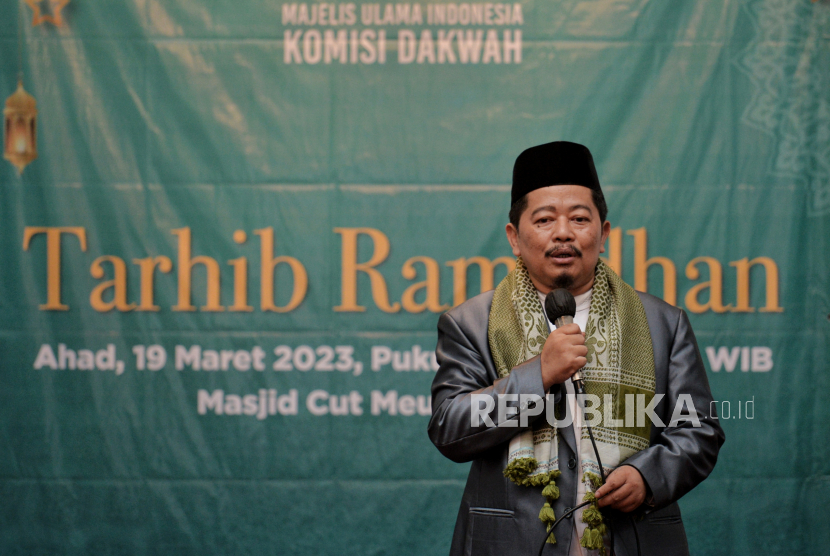REPUBLIKA.CO.ID, JAKARTA -- A moderate understanding of Islamic teachings is in line with the ideal of establishing Indonesia. Chairman of the Dakwah Commission of the Indonesian Ulama Assembly (MUI), Ahmad Zubaidi explained that in moderate Islam or Wasathiyah Islam two principles are known, namely at-tawazun and at-tasamuh. Both are the mainstays of contemporary Islamic thought that tends to be inclusive and promotes religious tolerance.
“At-tawazun is a balanced and proportionate attitude towards things, including dissent and religion. At-tawazun also means avoiding extreme and fanatical attitudes, both in religion and in social life,” explained Kiai Ahmad Zubaidi in Jakarta, Thursday (7/12/2023).
“While at-tasamuh is an attitude of tolerance and mutual respect among religious people. At-Tasamuh also means recognizing and appreciating differences, as well as upholding human values,” he said.
According to him, these two principles became logical consequences in the application of Wasathiyah Islam. It is quite clear that Islam teaches tolerance, as taught in the Quran in Surat Al-Kafirun, lakum dinukum wa liya diin, which means “for you your religion, for me my religion. “This passage has become a clear demarcation line and illustrates the attitude of Islam towards the teachings of different religions.
He continued that on the order of perspective of belief and faith, Islam has firmly determined its stance. But from a social perspective and a Muslim perspective, people should not be separated because of a certain partition or boundary just because of different religions. Moderate Islam does not mean exchanging beliefs with other people, but even if there are differences in beliefs, people can still communicate well with each other.
“I think it is important that a moderate understanding of Islam continues to be developed for Muslims in Indonesia, so that their views are always inclusive. The concept of inclusiveness itself is not a contrived attitude, but from the very beginning Islam has been inclusive. It can accept and coexist with other religions,” explained Kiai Ahmad Zubaidi.
He took an example from the life story of the Prophet. When the Prophet went on hijrah and reached the city of Yastrib, the Messenger of Allah formed a state called the state of Medina. In it there are Muslims, Christians, and Jews living side by side.
In his time, the Prophet led Madinah without distinguishing between religions. Even in order to guarantee a good life among the religions that existed in Medina at that time, the Prophet (pbuh) made a covenant called the Covenant of Medina.
“The Covenant or Charter of Medina is also known as the Shohifah of Medina. Some sources also refer to it as the Treaty of Medina or the Medina Charter. The essence of this agreement is to symbolize that in those times, Medina has succeeded in being a very plural state in guaranteeing the religious life of its people,” he said.
He elaborated that the importance of tolerance is even mentioned in the Charter of Medina in its first chapter, which reads innahum ummatun wahidah, they are one people. This statement is clearly the same as the essence of Bhinneka Tunggal Ika, although different but still one. It is this spirit that should inspire Indonesians to apply tolerance in community life.
Furthermore, KH Ahmad Zubaidi explained, historical facts show that in establishing this Indonesian state, the founders of the Indonesian nation made the 1945 Constitution. According to Prof. Ahmad Sukarja's research, the 1945 Constitution is actually similar to the Medina Charter.
“The 1945 Basic Law is similar in substance to the Medina charter. Of course, this is not a mere coincidence, I think indeed the founders of our nation have learned that and then inspired them in the establishment of the 1945 Constitution as the basis of our country,” said KH Ahmad.
In addition, he said, moderate Islamic thought views tolerance as a barometer of faith in a Muslim. The more we declare ourselves to be people of strong faith, the greater is the responsibility to promote tolerance in our daily lives.
Therefore, it would be impossible for a person to feel strongly about his faith but become more and more exclusive and intolerant of followers of other religions. If someone claims to be good at his religion but is intolerant, then this is an unjustified view.
“It is the necessity of all that in this life we need to be encouraged by the understanding of Wasathiyah Islam. It is clear that Islam strongly encourages tolerance in life, and we strongly reject intolerance movements in the name of any religion,” said Ahmad Zubaidi.


